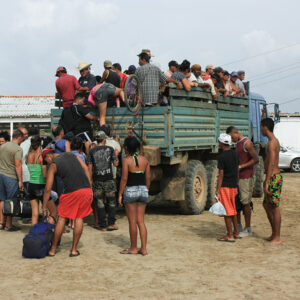If you ask Central Americans why their economies don’t produce more job opportunities, they will generally cite lack of investment, poor infrastructure, an inadequately trained and educated workforce, and a weak public health infrastructure. Many will also point to widespread violent crime driven by narcotics trafficking, an outmanned and outgunned police force, and a crumbling justice system.
All of these answers are correct, of course, as far as they go. But why doesn’t investment flow? Why are the infrastructure, education and health systems so poor? Why are the police and the courts unable to enforce the law?
Ultimately, everyone will agree that the underlying problem at the root of all those societies’ ills is corruption.
When Central Americans talk about corruption, they mean the bureaucrat who takes the price of a cup of coffee for putting your file on top of the stack. And they mean the politician who takes a percentage off the top of a public contract or who turns a blind eye to organized crime.
They mean institutions and leaders that have so completely lost credibility with the public that they are unable to function.
How do countries escape this trap? Often a crisis will lay bare the corruption for all to see, and a broad-based movement — whether a political party or civil society organization — arises to show the way to a more inclusive future.
There has been no shortage of crises in Central America: hurricanes, earthquakes, civil conflict, mass emigration and the pandemic to name just a few. But the one time that political leadership did seize the initiative — in the immediate aftermath of the region’s civil conflicts 30 years ago — it couldn’t quite deliver sustained hope of prosperity before its efforts, too, devolved into corruption and decay.
One factor that sets Central America apart from other regions or countries that have found themselves in this kind of dead end is the towering importance of the United States in its social, political and economic life. We are their major trading partner and source of foreign investment; millions of Central Americans have found a home in the United States; we are the cornerstone of their national security.
As a result, even if the solution to Central America’s core challenge can only emerge from Central Americans’ own efforts, it is hard to see how they can succeed without support from the United States. American diplomacy cannot create the movement that will ultimately seize the opportunity presented by a crisis to lead those societies out of their dead end. But it can acknowledge and encourage that movement when it appears and help create the permissive regional and international environment it will need to succeed.
COVID-19 has certainly laid bare the myriad distortions of political and economic life in Central America. Where is the broad political movement that can credibly lead those countries to a more inclusive future? Is it President-elect Xiomara Castro in Honduras? Is it the robust ecosystem of market-oriented think tanks in El Salvador and across the region? Is it the nascent political movements headed by globally minded millennials in Guatemala?
Any of these could turn the tide against Central America’s endemic corruption, just as they could, as past popular leaders have, devolve into custodians of the status quo. The difference could well lie with nimble American diplomacy that avoids one-size-fits-all approaches, identifies a winner early, and offers discreet political support.
As the U.S. government struggles to address the “root causes” of out-migration from Central America, is this the diplomacy we have?
American support should go to leaders and movements credibly committed to economic policy reform, without political, ideological or other litmus tests — and we should be realistic about the chances of finding effective, influential Central American partners who are completely untainted by corruption themselves.
At the end of the day, we can play an important role in those countries’ future, if we focus on our interests there rather than our domestic political debates.

